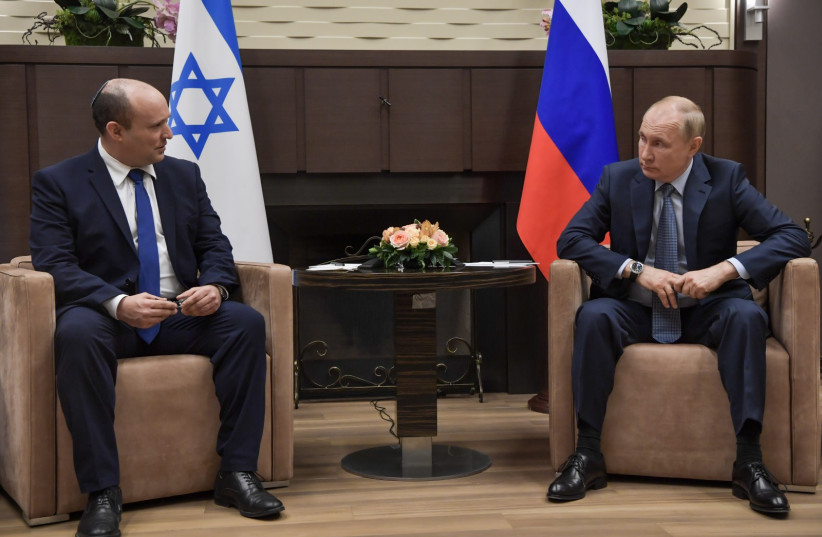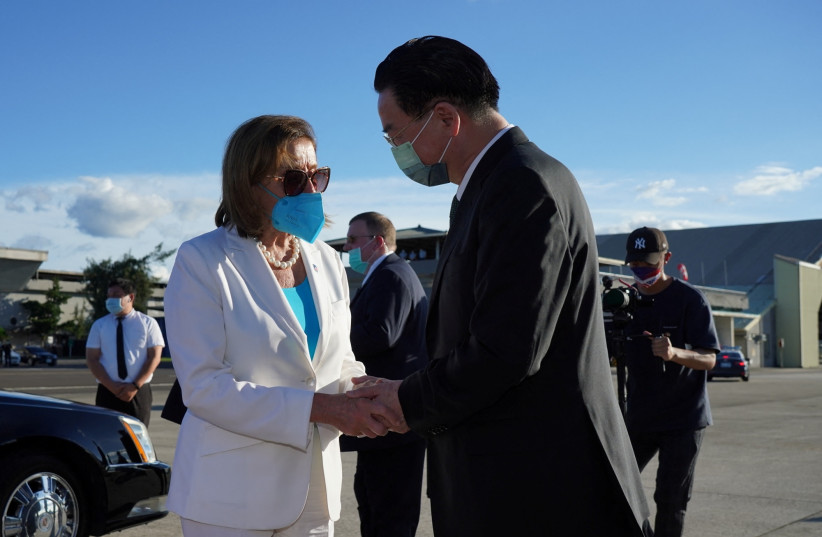Russia invaded Ukraine on February 24, igniting a global crisis.
The invasion was far from Israel, had nothing to do with Israel or the Jews. True, there are sizable Jewish populations in both countries, and Ukraine’s President Volodymyr Zelensky is Jewish, but this was a crisis from which Israel – beyond supporting the US and the West in their condemnation of Russia for the unprovoked attack – could have stayed far away.
It chose not to.
Instead, then-prime minister Naftali Bennett pushed Israel to the front of the action and offered Jerusalem’s good offices as a mediator.
Forget that Israel has no experience in mediating this type of global crisis, nor did it have any leverage over the Russians or Ukrainians to speak of – a general prerequisite for successful mediation. What it did have were good relations with both countries, and Bennett had an open and good line of communication with both Zelensky and Russian President Vladimir Putin.

Israel could have stayed completely out of that global crisis but opted to get involved. Its mediation efforts led nowhere, but the country is no worse off for trying.
Will the past repeat itself?
Fast forward six months, and the world is on the precipice of yet another global crisis, this one precipitated by US Speaker of the House Nancy Pelosi’s visit on Wednesday to Taiwan. China is threatening military steps in response, while Washington is advising Beijing not to do anything rash.

In the spirit of Israel’s efforts to mediate the last global crisis in February, there may be some in Jerusalem who think that because Israel has excellent relations with the US, and good relations with both China and Taiwan, it might have something to offer in terms of lowering the tension.
If anyone is harboring any such ideas, former ambassador to China Matan Vilnai, currently president of the recently opened China International University in Israel in Petah Tikva, has one piece of advice: don’t.
Do not get involved, he said. This isn’t Israel’s fight. It has nothing to do with Israel. It is part of the complicated US-Sino relationship. Stay out of it – as far out of it as possible.
That, of course, makes perfect sense. While there are potential consequences for Israel in the Russian-Ukrainian war – both because of Russia’s dominant presence in Syria and because of the large Jewish community in Russia – Vilnai said the US-China crisis over Taiwan has no ramifications for Israel.
“We are outside the picture,” he said. “This is a complicated issue between the Chinese and the US. It is not connected to us.”
“We are outside the picture. This is a complicated issue between the Chinese and the US. It is not connected to us.”
Matan Vilnai, Former Israeli ambassador to China
Despite China’s bellicose threats, Vilnai said it is unlikely that Beijing will take any military action as a result of Pelosi’s visit.
The Chinese, who view Taiwan as a renegade province that they hope to eventually bring under their control, “are doing what they think they need to [as a result of the Pelosi visit], but will not go to war over this.” Vilnai said the Chinese will stretch the rope as far as they can without pulling it apart, “to show everyone how they relate to Taiwan, so that tomorrow there will be no other high-profile visit.”
Vilnai, who served as Israel’s ambassador to China for more than four years, said the country’s leaders are “responsible,” and well understand the significance of a military confrontation. While the Cold War in Europe ended with the fall of the Soviet Union, it did not end in East Asia, and what is currently transpiring there is a reminder of that.
Where does Israel's position leave Taiwan?
Israel, like the US and all but 14 countries in the world, does not have full diplomatic ties with Taipei. Taiwan is represented in Israel through the Taipei Economic and Cultural Office in Tel Aviv.
Ya-Ping (Abby) Lee, representative of that office, said Pelosi’s visit was important for her country because it was a “reassurance of the bipartisan and rock-solid US support not only for Taiwan, but for global democracy as a whole.”
Asked what position Taiwan would like Israel to take right now, Lee said it was important for all democracies to “stand together” against the threats of authoritarian regimes, and that “international support is very important” for Taipei.
“We would like to see all the democracies standing in unity during this difficult time,” she said. “All the fellow democracies should stand together.”
As to whether Taipei is expecting some public comment or statement of support from Israel, she replied, “I would leave it for the Israeli government to decide. But we know that solidarity among fellow democracies is very critical at this moment.”
Lee said the only thing keeping China at bay is Taiwan’s “enhanced defense capabilities and growing international support.”
Taiwan accounts for the manufacture of 86% of the world’s computer chips, and 92% of the advanced semiconductors, something that Lee said also gives the country a “silicon shield.”
China, which on Tuesday banned the import of 1,000 food imports from Taiwan in apparent retaliation for the Pelosi visit, gets a good share of its semiconductors from Taiwan, and if that supply were to dry up, the Chinese economy would be crippled. According to Vilnai, about half of Israel’s exports to China, which last year amounted to $4.3 billion, are computer chips manufactured at the Intel plant in Kiryat Gat.
Both Israel and Taiwan, Lee said, “are students of survival who need to do good homework regarding threats that unfriendly countries bring to us.” She said Israel’s story is “very admirable,” and what Taipei has learned from Israel is that “you should never bow to pressure and should keep strong defensive capabilities.”
Asked what lesson Israel stands to learn from the current crisis, Lee replied, “I would say that international support is very important, and how democracies standing in unity is also very important.”
Reminded that many Israelis believe that if push comes to shove, Israel can rely only on itself and not on international support, she said, “Of course, your self-capability is very important, but international support is very important, too.”
